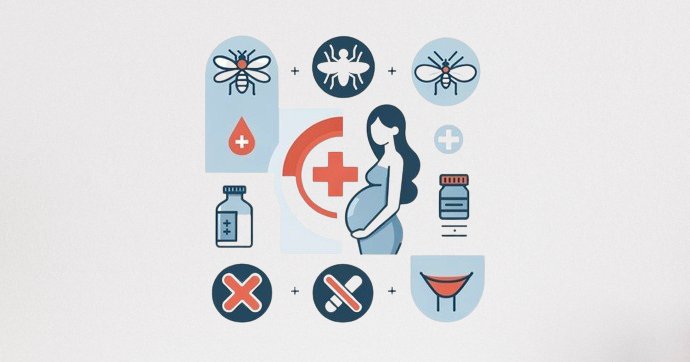Abstract
Malaria in pregnant women, particularly those infected with HIV, poses significant health risks, including adverse maternal and neonatal outcomes. This perspective examines various prophylactic strategies, emphasizing recent clinical trial findings on the efficacy and safety of newer antimalarial drugs. Sulfadoxine-pyrimethamine (SP) has been a conventional choice for intermittent preventive treatment during pregnancy (IPTp). However, its effectiveness is compromised due to its interaction with cotrimoxazole (CTX), a medication frequently used for individuals with HIV. This interaction limits it’s utility. Recent research emphasizes the promise of dihydroartemisinin-piperaquine (DP) as an effective alternative, given its prolonged half-life and robust safety profile, including among HIV-infected pregnant women in regions with minimal malaria transmission. While DP did not notably lower the incidence of placental malaria, it effectively reduced the occurrence of clinical malaria and overall Plasmodium falciparum infections, indicating its potential to improve maternal health in endemic areas. Mefloquine (MQ), another alternative, though effective, is associated with severe side effects and increased HIV transmission risks, highlighting the need for cautious implementation. This narrative underscores the complexities of managing malaria prophylaxis in this vulnerable population, urging a tailored approach based on regional epidemiology and resistance patterns. The integration of these findings into health policies could significantly improve outcomes for mothers and newborns in sub-Saharan Africa, where malaria and HIV prevalently intersect. The ongoing adaptation of these interventions is critical to addressing the dynamic challenges of co-infections in pregnancy, ensuring effective and safe treatment pathways.
Keywords:
dihydroartemisinin-piperaquine, HIV-infected pregnant women, malaria prophylaxis, cotrimoxazole, mefloquineReferences
Desai M, Hill J, Fernandes S, Walker P, Pell C, Gutman J, et al. Prevention of malaria in pregnancy. Lancet Infect Dis. 2018;18(4):e119-e32.
Mirzohreh S-T, Safarpour H, Pagheh AS, Bangoura B, Barac A, Ahmadpour E. Malaria prevalence in HIV-positive children, pregnant women, and adults: a systematic review and meta-analysis. Parasit Vectors. 2022;15(1):324.
Flateau C, Le Loup G, Pialoux G. Consequences of HIV infection on malaria and therapeutic implications: a systematic review. Lancet Infect Dis. 2011;11(7):541-56.
World Health O. Intermittent preventive treatment of malaria in pregnancy using sulfadoxine-pyrimethamine (IPTp-SP): updated WHO policy recommendation. Geneva: World Health Organization; 2012 2012. Contract No.: WHO/HTM/GMP.2012.05.
World Health O. Consolidated guidelines on the use of antiretroviral drugs for treating and preventing HIV infection: recommendations for a public health approach, 2nd ed. 2016.
WHO. Meeting report of the Evidence Review Group on malaria in pregnancy. 2017.
González R, Sevene E, Jagoe G, Slutsker L, Menéndez C. A Public Health Paradox: The Women Most Vulnerable to Malaria Are the Least Protected. (1549-1676 (Electronic).
González R, Mombo-Ngoma G, Ouédraogo S, Kakolwa MA, Abdulla S, Accrombessi M, et al. Intermittent preventive treatment of malaria in pregnancy with mefloquine in HIV-negative women: a multicentre randomized controlled trial. (1549-1676 (Electronic)).
Mofenson LM, González R, Desai M, Macete E, Ouma P, Kakolwa MA, et al. Intermittent Preventive Treatment of Malaria in Pregnancy with Mefloquine in HIV-Infected Women Receiving Cotrimoxazole Prophylaxis: A Multicenter Randomized Placebo-Controlled Trial. PLoS Med. 2014;11(9).
Denoeud-Ndam L, Zannou D-M, Fourcade C, Taron-Brocard C, Porcher R, Atadokpede F, et al. Cotrimoxazole Prophylaxis Versus Mefloquine Intermittent Preventive Treatment to Prevent Malaria in HIV-Infected Pregnant Women. JAIDS J Acquir Immune Defic Syndr. 2014;65(2):198-206.
Denoeud-Ndam L, Clément M-C, Briand V, Akakpo J, Agossou VK, Atadokpédé F, et al. Tolerability of Mefloquine Intermittent Preventive Treatment for Malaria in HIV-Infected Pregnant Women in Benin. JAIDS J Acquir Immune Defic Syndr. 2012;61(1):64-72.
World Health O. WHO Guidelines for malaria. 2023.
Kakuru A, Jagannathan P, Muhindo MK, Natureeba P, Awori P, Nakalembe M, et al. Dihydroartemisinin–Piperaquine for the Prevention of Malaria in Pregnancy. N Engl J Med. 2016;374(10):928-39.
González R, Nhampossa T, Mombo-Ngoma G, Mischlinger J, Esen M, Tchouatieu A-M, et al. Safety and efficacy of dihydroartemisinin–piperaquine for intermittent preventive treatment of malaria in pregnant women with HIV from Gabon and Mozambique: a randomised, double-blind, placebo-controlled trial. Lancet Infect Dis. 2024;24(5):476-87.
Barsosio HC, Madanitsa M, Ondieki ED, Dodd J, Onyango ED, Otieno K, et al. Chemoprevention for malaria with monthly intermittent preventive treatment with dihydroartemisinin–piperaquine in pregnant women living with HIV on daily co-trimoxazole in Kenya and Malawi: a randomised, double-blind, placebo-controlled trial. Lancet. 2024;403(10424):365-78.
Klement, E., et al., Effectiveness of Co-trimoxazole to Prevent Plasmodium falciparum Malaria in HIV-Positive Pregnant Women in Sub-Saharan Africa: An Open-Label, Randomized Controlled Trial. Clin Infect Dis. 2013. 58(5): p. 651-659.
How to Cite
License
Copyright (c) 2024 Manya Soni, DM Shilpa, Mirza Adil Beig

This work is licensed under a Creative Commons Attribution-NonCommercial 4.0 International License.
Copyright© by the author(s). Published by the Evidence Journals. This is an open access article distributed under the terms of the Creative Commons Attribution (CC BY) license (https://creativecommons.org/licenses/by/4.0/), which permits unrestricted use, distribution, and reproduction in any medium, provided the original author(s) and source are credited.
Most read articles by the same author(s)
- Vijay Kumar, Manya Soni, Mehak Dutt, Assessing the incidence of myocarditis risk in mRNA COVID-19 vaccines: a systematic review and meta-analysis , The Evidence: Vol. 2 No. 1 (2024): JAN - MAR




